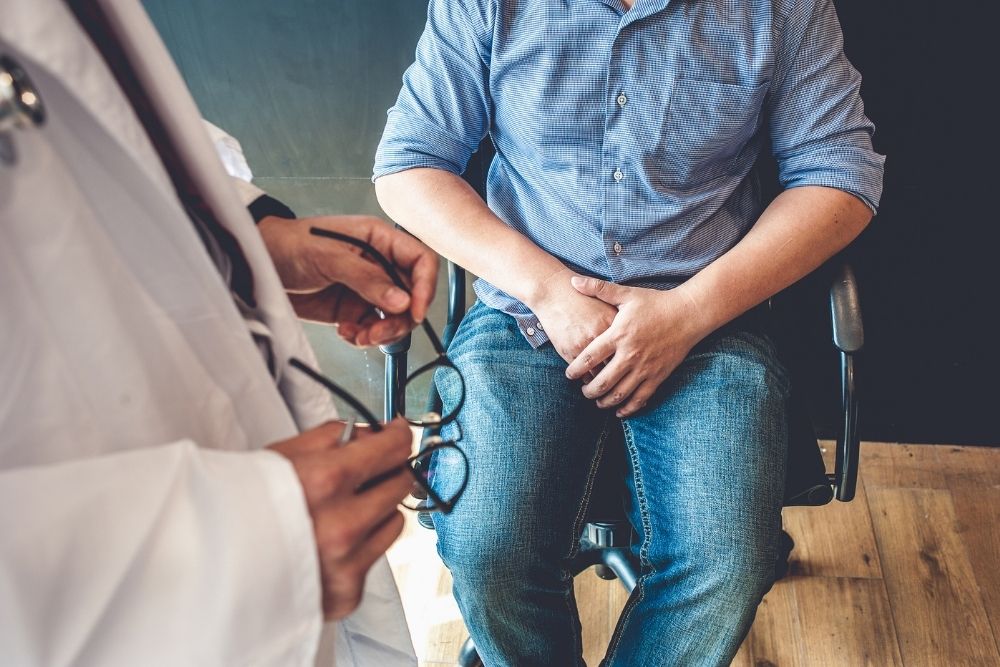As we age, certain health concerns pop up that can make life a bit more uncomfortable. For men, one of these conditions is benign prostatic hyperplasia (BPH). This is a term for an enlarged or swollen prostate that can lead to uncomfortable symptoms during urination.
In order to maintain healthy urinary habits as you age, it is important to learn and understand the BPH signs and symptoms, risk factors, diagnosis, and treatment options available.
What is Benign Prostatic Hyperplasia?
Benign prostatic hyperplasia or BPH is a condition when cells in the prostate multiply causing the prostate to swell up or increase in size. The prostate gland is a walnut-sized gland that surrounds the urethra, the small tube that allows urine to flow from the bladder. When the prostate gland is swollen, this puts pressure on the urethra, narrowing the tube and interfering with the flow of urine.
The prostate usually begins to grow when men reach their 40s and BPH can become a problem for men 50 and beyond. While BPH is characterized by excessive cell growth, it is not cancerous. However, the symptoms can significantly impact your quality of life.
What are Symptoms of BPH?
Benign prostatic hyperplasia symptoms include:
- Increased frequency in urination, usually every 1-2 hours.
- Feeling an urgent need to pass urine.
- Difficulty starting to urinate.
- Needing to strain or push to pass urine.
- Feeling your bladder is full, even after urinating.
- Need to stop and start several times when urinating.
- Weak stream of urine.
- Need to wake up multiple times at night to urinate.
These BPH symptoms can significantly impact your quality of life, affecting your sleep and ability to participate in certain activities.
If the blockage of the urethra becomes severe, complications of BPH can occur. The blockage can prevent urination completely, which may become life threatening and cause damage to the kidneys. If you see blood or experience severe pain while urinating, seek immediate medical attention.
Benign Prostatic Hyperplasia Causes
The most common BPH risk factors are being over 50 and a family history of prostate enlargement. As common as this condition is in older men, the underlying cause of BPH is unknown. It is just considered a normal condition of aging.
Some potential BPH causes include changes in sex hormones that occur with advancing age and a family history of prostate problems. Being overweight or having a chronic illness like diabetes or heart disease may also increase your risk of BPH.
How to Diagnose BPH
A BPH diagnosis usually starts with a physical exam by a healthcare provider. This exam will include a medical history and evaluation of any bladder or urinary concerns.
The doctor may also examine the lower abdomen and perform a digital rectal exam to assess the prostate size and shape. This allows the doctor to evaluate if there is a concern for prostate cancer.
Depending on the medical evaluation, certain diagnostic BPH tests will be performed. These will also rule out more severe conditions, such as cancer. Tests can include:
- Urinalysis
- Urine culture
- Blood creatinine
- Blood urea nitrogen
- Hemoglobin
- Prostate specific antigen (PSA)
- Prostate biopsy
One thing to note about the PSA test, an elevated level can be an indication of prostate cancer, but levels can also increase with BPH. A doctor can help evaluate your risk and do further testing if needed.
Treatment of Benign Prostatic Hyperplasia
There are many treatments for BPH, most involve self-care, lifestyle changes, and at-home remedies if the enlargement is not severe. If urination begins to be significantly impacted, medication, therapies, and surgery might be necessary.
Dietary and lifestyle changes might be able to help improve the symptoms of BPH. Following an anti-inflammatory diet that includes foods high in omega-3s, like fish, and foods high in antioxidants like berries and green vegetables is a great place to start. Certain BPH supplements that contain supportive ingredients like vitamin D or antioxidants like quercetin may also be beneficial for maintaining normal prostate health.
Lifestyle changes can also help improve symptoms of BPH. Some of these include actively managing your stress, getting regular exercise, losing weight, and practicing Kegel exercises to strengthen the pelvic floor.
If symptoms become more uncomfortable or severe, medications or surgery may be required. As medical technology advances, there are many options for medications or surgery that are minimally invasive and might help. Always speak to your doctor about what options are best for you.
Living with Benign Prostatic Hyperplasia
While medical treatments are available for BPH, they may not always be necessary. BPH is not prostate cancer, but some early symptoms can be similar. Therefore, it is important to visit with your doctor regularly for appropriate screenings.
A healthy lifestyle goes a long way for managing prostate health. By starting a good diet and lifestyle changes early in your journey as well as communicating regularly with your doctor, you can live a healthy and comfortable life with BPH.
If you need help with nagging prostate issues, be sure to check out our special offer (it’s online only) and try ProstaGenix today!



